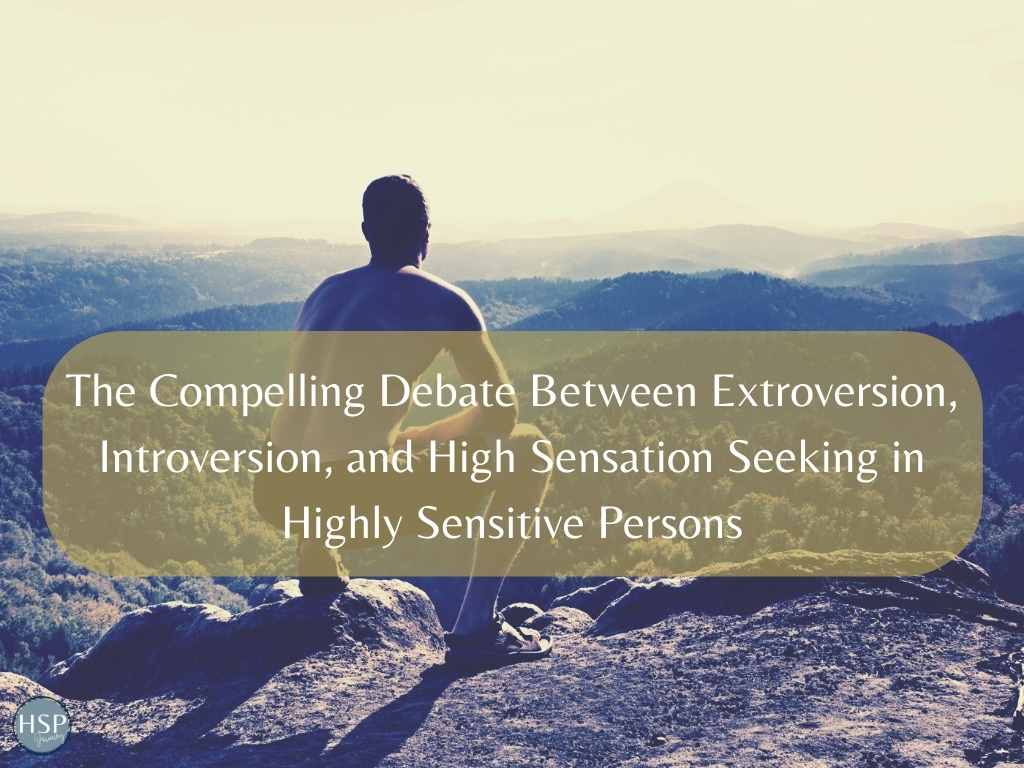If you consider yourself a Highly Sensitive Person, have you thought about where you draw your energy from? The debate of introversion (drawing energy from alone time) or extroversion (drawing energy from being with people) is complex. Yet, it’s a simple question, and you might think, “duh, I’m an extrovert or an introvert.” But we aren’t exclusively just one or the other. Most likely, we are a combination of both, and other innate traits make it easy for us to err in thinking we are solely one or the other. There’s a third trait, the trait of High Sensation Seeking (HSS) also at play. Let’s take a closer look at the relationship between extroversion, introversion, and High Sensation Seeking in Highly Sensitive Persons.

Table of Contents
Introverts recharge by spending time alone and are very aware of their internal thoughts. Extroverts can be just the opposite. Extroverts are often more outspoken and outgoing and gain energy from being around other people.
It is essential to mention that social skills are not a determining factor in distinguishing an extrovert from an introvert. Many introverts have superb social skills; being an introvert is exclusively about where you draw your energy.
Myers-Briggs Type Indicator Can Help Determine Introversion or Extroversion
There are instances where people score between 45-55% (I)ntroversion or (E)xtroversion in their Myers-Briggs Type Indicator, making them a true ambivert (a.k.a. extrovert-introvert or introvert-extrovert.) In other words, a true ambivert is a person whose personality has a balance of extrovert and introvert features.
On the other hand, there is another type of personality that can also be confused for an ambivert when you factor in their sensitivity trait needs to remove stimulation and crowds to be in solitude and replenish their depleted senses. For the purposes of this article, I’m making the distinction between an ambivert and a true ambivert.
The Sensitivity Scale
So do you feel and think deeply about everything? Are you easily overwhelmed by strong sensory input? Approximately 20% of the world’s population is born with a superpower of high sensitivity. But unfortunately, it’s often mischaracterized as “too sensitive” these empathetic souls feel and think deeply about their inner world and surroundings.
A highly sensitive person is considered an orchid person who thrives under controlled conditions. On the other hand, a dandelion can grow anywhere and scores very low on the sensitivity scale. Meanwhile, tulips are most of the general population between those two extremes.
Removing Stimuli for Highly Sensitive Persons
So, if you score high on the sensitivity scale, your need to remove yourself from stimulants in your environment could be perceived as introversion by others or even yourself. But you can be alone and still be overstimulated. For example, how often are you watching a movie that could be too violent or emotionally heavy and have difficulty relaxing afterward?
Strong sensory input lingers longer on HSPs, unaware of the difference between needing to be alone vs. needing to remove all stimulation (loud noises, bright lights, strong smells, rough fabrics, emotionally charged environments, etc.)
7 Gifts of Being a Highly Sensitive Person
For an orchid person (a.k.a. HSP) like myself, 2/3 extroverted, I tend to live and act like an ambivert–even though I am not. I still draw my energy from others as an extrovert, but I also become overstimulated and need to do the opposite; spend time alone while also removing all stimulants. For so long, I thought I was an ambivert–my high sensitivity makes up for the percentage I am not introverted and balances me equally wanting time around others, alone, and replenishing my senses.
Understanding where we score on the sensitivity scale is important for an HSP to gain awareness, work on accepting our innate traits, and learn how to be adaptive, creating the environments necessary to control the things we can and let go/adapt to what we can’t is vital.
Shyness is Not Genetic, High Sensitivity Is
Did you know that being shy is not a genetic personality trait? According to Dr. Michael Pluess, about 50 percent of differences in sensitivity between people are due to genetic factors, the other half to the environment, including the prenatal environment.
No one is born shy. Shyness is an excellent example of hypersensitivity. You probably were a very cautious and observant child growing up. Unfortunately, adults mischaracterized you as a “shy” child for lack of better understanding. When in reality, you weren’t shy. You were a highly sensitive person. Hypersensitivity and high sensitivity are often confused with being the same, but they couldn’t be more different.
Hypersensitivity vs. High Sensitivity
Hypersensitive people are often very insecure and feel the world is out to get them. In addition, they are emotionally fragile, meaning that minor instances can shake them and make them feel like their ego’s taken a big hit. On the other hand, highly sensitive people are emotionally intuitive, have an excellent knack for empathy, are very observant, and often care about the feelings of others more than their own.
30% of HSPs are High Sensation Seekers (HSS)
Do you despise boredom but walk a thin line between overwhelmed and underwhelmed? Approximately 30% of highly sensitive people can also be high sensation seekers (HSS.) Not all HSPs are HSSs and vice versa. It may seem counterintuitive due to our sensitive nature, but a population of HSPs continuously strives to seek out new life experiences.
7 Gifts of Being a High Sensation Seeker
Sky diving or bungee jumping might not be for everyone or every high sensation seeker. Not all high sensation seekers are the same.
There are four types of high sensation seekers:
- Thrill and adventure-seeking – enjoyment of outdoor activities of unusual sensations or risk
- Experience seeking – enjoys new sensory or mental experiences through unconventional choices
- Disinhibition – the ability to be spontaneous and lose your inhibitions
- Boredom susceptivity – the ability to tolerate the absence of external stimuli
The results, described in Psychological Science, a journal of the Association for Psychological Science, reveal some interesting differences between high sensation seekers and low sensation seekers. The brain images showed that when high sensation seekers viewed arousing photographs, there was increased activity in the brain region known as the insula instead of the frontal cortex.
High Sensation Seekers (HSS) respond to strong arousing cues but have less activity in brain areas associated with emotional regulation. Being an HSP and an HSS can be quite the battle until you learn to leverage these characteristics as strengths! We HSPs/HSSs have a narrow range of optimal arousal. As a result, we struggle with finding harmony between our overwhelm and underwhelm (the need for new sensations.)
Here’s a quiz to determine if you’re a High Sensation Seeker (HSS)
So if you are a sensitive sensation seeker (a.k.a. an HSP & HSS), you are blessed with the capacity for emotional regulation and high cognition processing–the best of both worlds!
There are two main aspects I work with my clients when designing fulfilling lives that align with their innate temperaments:
- Identity – How well do you understand and accept yourself? What are your innate traits and gifts? What are you like when alone?
- Growth Experiences – Are you building a life that supports your authentic Self? How proactive are you about taking on new challenges? Are you living life or is it living you?
Energy and sensitivity can be complex topics. It’s not as black and white as being an introvert or extrovert. However, understanding and designing our lives to support our innate traits is the highest form of self-care. Lead by example–it’s never too late to start honoring all of you.
How do I know if I’m a Highly Sensitive Person (HSP)?
This is a great question. Many people who are highly sensitive feel that they were not understood as children. They were frequently told they were too sensitive or cried too often. You can reference our list of HSP quizzes to see how you score and this can inform whether or not you are a Highly Sensitive Person.
Be sensitive, be free
*This post contains affiliate links and I will be compensated if you make a purchase after clicking on my links*





[…] relationships. You need more downtime. You require more rest and quiet than others. You might be introverted AND an HSP meaning that you need to monitor how much time you are with people and how to recoup […]